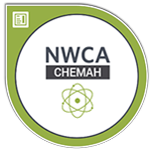PURPOSE
The Chemistry for Allied Health credential is designed to document the essential competencies related basic chemistry including chemistry measurement methods, basic properties and states of chemicals, organic chemistry concepts, and biochemistry basics.
AUDIENCE
This credential is appropriate for many different allied health professionals who must document a basic knowledge of chemistry in the performance of their job. This group of professionals may include medical assistants, pharmacy technicians, EKG technicians, respiratory therapists, dental assistants and hygienists, veterinary technicians and assistants, nursing professionals, lab technicians, phlebotomists, and others.
JOB/CAREER REQUIREMENTS
The Chemistry for Allied Health Professionals credential documents competencies that include the knowledge of basic chemistry required for many allied health professionals. Typically these positions must have a basic understanding of chemicals and chemical processes of inorganic chemistry, organic chemistry, and biochemistry. They do not necessarily need to be able to complete lab tasks using this knowledge, but do need to understand the concepts as a fundamental knowledge base for the medical concepts within their scope of work.
CHEMISTRY FOR ALLIED HEALTH WORKPLACE TASKS:
- Medical laboratory technicians must have a solid foundation in chemistry in order to understand fully the lab tests they perform on blood and other body fluids, pathogens, toxins, and other substances
- Clinical medical assistants must have a basic understanding of chemistry to support their knowledge of physiological processes, nutrition, and the disease process
- Respiratory therapists use chemistry as a foundation for understanding the therapeutic treatments they provide for patients
- Nursing professionals and others who work in the medical field use basic chemistry concepts as a foundation for understanding anatomy and physiology, disease processes, nutrition, and drug actions
- Pharmacy technicians can use a basic knowledge of chemistry to understand human anatomy and physiology, drug action, and disease processes
EXAM STRUCTURE OVERVIEW
Number of Questions in Exam: 125
Total Time: 120 minutes
Overall Passing Score: 70%
(All sections require an individual passing score of 70%)

